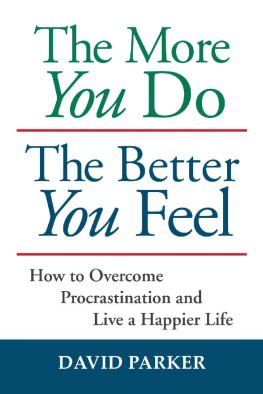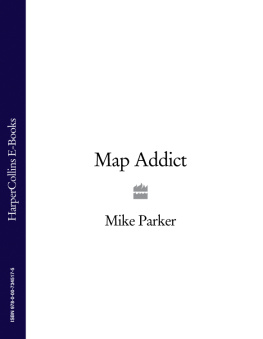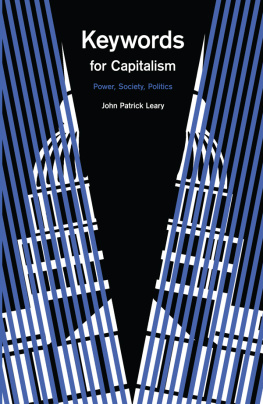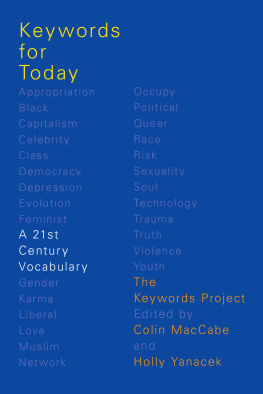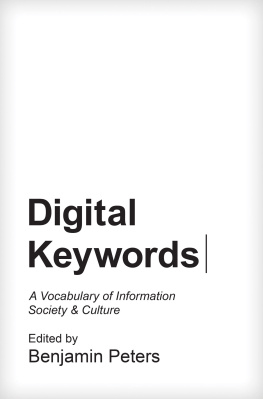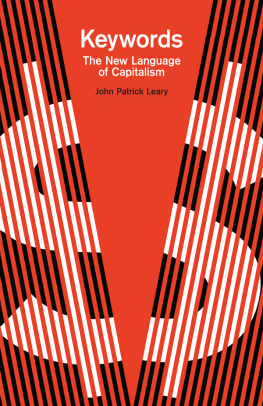WHAT PEOPLE ARE SAYING ABOUT
Revolutionary Keywords for a New Left
Ian Parkers Keywords are an extremely useful tool for activists who want to orient themselves among the various words circulating in left discourses. With his clear and accessible prose, Parker manages to successfully combine theoretical and practical concerns, never losing sight of the goal: transforming the world through political practice.
Cinzia Arruzza, New School for Social Research, New York
Ian Parkers Revolutionary Keywords is an innovative and rigorous analytic for the contemporary left whose passionate discourses sometimes lose the theoretical clarity that distinguishes Marxs own writings. Revolutionary Keywords takes philosophical risks by unlayering the conceptual densities of such complex concepts as antagonism, normalcy, precarity, and accelerationism. In laying bare each concept, Parker provides the philosophico-historical lines of its formation and situates it within its broad social conditions. The book is a pioneering convergence of activist writings and philosophical inquiry.
Teresa L. Ebert, author of The Task of Cultural Critique
First published by Zero Books, 2017
Zero Books is an imprint of John Hunt Publishing Ltd., Laurel House, Station Approach, Alresford, Hants, SO24 9JH, UK
www.johnhuntpublishing.com
www.zero-books.net
For distributor details and how to order please visit the Ordering section on our website.
Text copyright: Ian Parker 2016
ISBN: 978 1 78535 642 1
978 1 78535 643 8 (ebook)
Library of Congress Control Number: 2016961111
All rights reserved. Except for brief quotations in critical articles or reviews, no part of this book may be reproduced in any manner without prior written permission from the publishers.
The rights of Ian Parker as author have been asserted in accordance with the Copyright, Designs and Patents Act 1988.
A CIP catalogue record for this book is available from the British Library.
Design: Stuart Davies
Printed and bound by CPI Group (UK) Ltd, Croydon, CR0 4YY, UK
We operate a distinctive and ethical publishing philosophy in all areas of our business, from our global network of authors to production and worldwide distribution.
Acknowledgements
Thanks to those who participated in the AntiCapitalist Initiative event to launch the third edition of Changing the Fragments in Manchester, and in the reading group for Dangerous Liaisons, two places that made me begin to think seriously about new keywords, and to participants in the feminist revolutionary left reading group that worked through some key texts, and thanks to comrades in different campaigns and groups, and those who responded to online first drafts of these different keywords, and thanks to Erica who read them all.
Introduction
This book is about how we turn our politics into words and into action, and why some words we use to describe what we are doing are key. These keywords in revolutionary politics have undergone some rapid change. I describe some of those changes, and fifty revolutionary keywords in the course of the book. I didnt realise how important this was until quite recently, and it is absolutely crucial to our attempt to link the many different movements that are now speaking out against exploitation and oppression.
When I first came into revolutionary politics, I couldnt understand what my comrades, as I learned to call them, were talking about most of the time. The words they used were unfamiliar, but bit-by-bit I learnt to use those words. In the process, I often forgot how strange they sounded to those who were outside the left, to those we wanted to win over to join our campaigns or our organisation. I would notice how strange these words were when I encountered comrades from rival groups who used the terms in slightly different ways. More so, I would be thrown into confusion when those terms were directly challenged by activists in other political movements who objected to some of our assumptions about the world that were carried along with those ways of speaking about it.
Some of the most disturbing objections were made by feminists who seemed to have their own quite different and parallel sets of terms that cut up the world in a quite different way to the one I had been schooled in. And when I say schooled, I mean how I was being taught to see the world through the networks of terms that my particular revolutionary tradition of politics used, taught through educational classes where we were taken through the Marxist classics and then, sometimes, tried to link class analysis with other kinds of progressive politics. That is, we attempted to link with the kinds of anti-racist and feminist politics that we defined as progressive, and in the process we also repeated what we had learnt about what was progressive and what was reactionary, what we could tolerate and what we wanted to avoid.
I learnt virtually nothing about politics or sociology or geography from my own schooldays. I read a lot of political material later on though, and had much more time to read when I was unemployed. By that time I had joined a left organisation. Some of the material I read, a lot of it actually, consisted of internal discussion bulletins which were, I later realised, closely modelled on academic political books and articles. There were some left journals that straddled the boundary between academic and political activism, or at least they pretended to do that, and what I was learning to do was also actually how to read academic political theory. Some of the editions of writings of our political leaders published by revolutionary organisations repeated definitions of unfamiliar terms, and I eventually quite enjoyed coming across a familiar term and scanning down to the bottom of the page to find the same definition of it pasted in again for us by the editorial team.
My sense of confusion was slowly replaced by a comforting sense, that as I become part of a revolutionary tradition I could recognise how the words that held it together worked; then I could appreciate how flexibly they could be applied to new situations. In my case I had joined a group tracing a direct line back to the Russian Revolution in 1917, but it was not an orthodox straight-edge Trotskyist group. It was a bit more academic than the other groups that was the accusation levelled against it by our rivals and more open. Detailed political-economic analyses of countries I had never heard of would be presented in line with a political language that was always reassuringly familiar. It is that very familiarity with the same old language of the left, however, that is now part of the problem we face as we try to make sense of the world and work out what we should do to change it.
What held this language in place? The easiest most obvious answer to this question would be that our Marxist vocabulary was the most accurate way of describing reality. For many years I was happy with that way of using the terms Id learnt in the branch educational classes and by reading the left press. It was a time when there were fifty-seven varieties of Trotskyist politics, and every article was an opportunity to sharpen our analytic skills. Thats what we all did, and while we shared our misunderstanding of the arguments we would correct each others versions of reality so that they either came into line with each other, or we could at least recognise those lines that were deviating from the right one.




